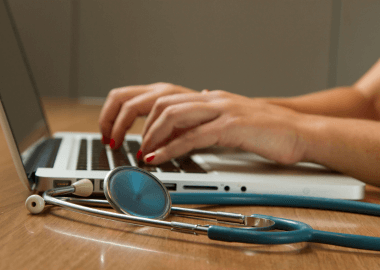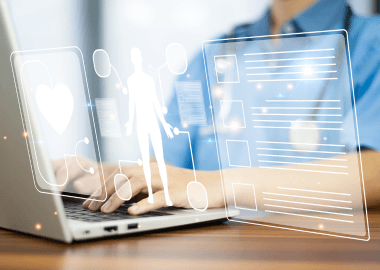How Data-Driven Decision-Making Helps Healthcare Management
On the road to data-driven healthcare, the first step is collecting a lot of data. And we’ve been pretty good at it. At present, an average hospital alone produces about 50 petabytes of data per year. How much is that? Well, for comparison, X (formerly Twitter) with half a billion users generates around 4.3 petabytes annually — 10 times less.
It’s time for the next step: using all this data to make informed healthcare decisions. Because honestly, there’s no other way to give patients better care, make innovations faster, and reduce costs. Any solution built to do that needs big data services.
In our article, we’ll cover how data helps in healthcare decisions. We’ll discuss why data-driven medicine remains a challenge. Also, we’ll share tips from our big data experience that have helped clients make better healthcare products.
Do you want to build a solution that helps healthcare professionals (HCPs) make data-driven decisions? Then keep reading.
Data-driven decision-making in healthcare uses data to guide medical choices. It doesn’t rely on a clinician’s experience or intuition. Instead, it uses clear and factual information.
Data-driven decision-making isn’t just an abstract idea. It’s a proven method with practical steps for real-world use. Data-driven decision-making follows six steps:

Here’s a real example from our portfolio. It shows how data-driven decision-making in healthcare works.
Meet Diaceutics, a long-term client of Digiteum. They have created the DXRX global platform. The platform gathers diagnostic testing data from labs all over the world. It then shares the data with precision medicine companies. Users include pharma, research institutes, and patient advocacy groups.
1. Define objectives
Precision medicine stakeholders begin by defining research goals. These can include tasks like finding markers for new drugs or deciding which patients qualify for clinical trials.
2. Identify and collect data
To move forward with their research, users need access to many diagnostic test results. But here’s the problem: this data is scattered across different lab databases. Accessing it is difficult and expensive.
To tackle this challenge, Diaceutics provides a solution: the DXRX platform. What happens once a company uses this platform? They get access to millions of patient records from over 50 countries, with personal details removed.
Just to give you an idea of the volume, DXRX’s data lake currently holds petabytes of diagnostic data. And the team, with help from Digiteum’s experts, is continually working to increase its size.
3. Organize and explore data
With so much data available, it’s easy to feel overwhelmed. To avoid this, Diaceutics creates and supports multiple data pipelines. These pipelines extract and transfer the data needed for each client’s research project.
4. Perform data analysis
After that, it’s time to enjoy the benefits of data visualization and see how the selected data is interconnected. Diaceutics’ clients use the DXRX platform to create projects, set up filters, and withdraw the insights they need.
5. Generate insights
Once the research is complete, the company gets answers or ideas for their project. For example, they might find new patients eligible for their therapy or identify new drug targets.
6. Implement and evaluate
Now, precision medicine stakeholders have all the information they need. They use this data to make clear and fact-based decisions when developing and selling products. What decisions? They may involve drug discovery, testing, targeted marketing, and so on.
Use data to drive healthcare innovations
We will help you design a product architecture, build tools to gather, process, and visualize data, and implement solutions for data-driven decision-making in healthcare.
Discover Big Data Services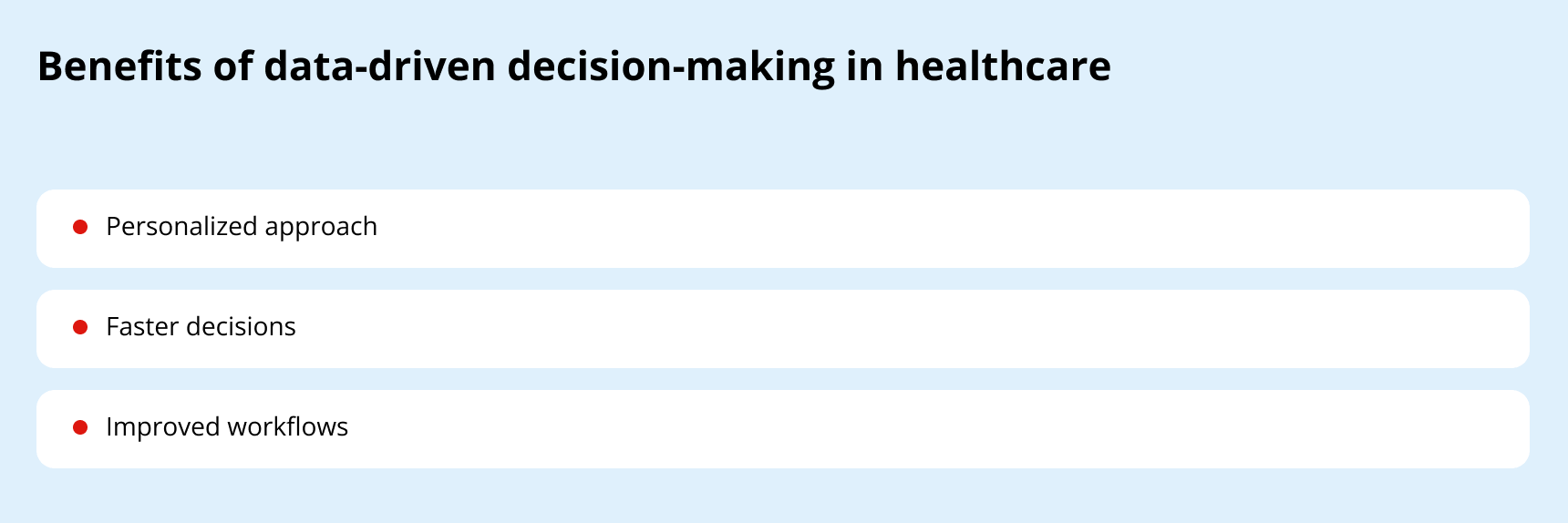
Personalized approach
94% of people believe data-driven healthcare creates new chances for personalized care. This comes from a recent study by Harvard Business Review.
The more data a clinician has, the better and more personalized care they can provide. This data typically includes:
- Existing symptoms
- Medical history
- Genetic information
- Social factors like employment status, income level, and environmental quality
- Lifestyle factors, such as diet, exercise habits, and substance use
- Health insurance information
And more.
Data in healthcare is stored across different systems. Big data solutions bring this information together into patient profiles. This helps clinicians understand their conditions better.
NextGate’s EHR manager platform is a US healthcare product based on this idea. It gathers data from various EHR sources and creates detailed patient records. Its main users are hospitals and HCPs. They can control data access, make edits, flag important records, and manage EHR data in other ways.
Digiteum worked on the project’s UX/UI. The main challenge was making an interface that could work with different NextGate clients’ systems. We made a simple interface with minimal connections between parts. This makes it easy for users to integrate and customize it for their needs.
Get UX/UI design that boosts your business
We will help you build and design a complex frontend that will engage users and improve their experience with your product.
Contact DigiteumFaster decisions
In healthcare, speed is critical. Sometimes, a person’s life depends on it. And we’re not talking about emergencies like the COVID pandemic when big data helped deliver vaccines faster. Routine healthcare tasks, such as diagnosing and treating patients, also rely on quick solutions.
Data-driven solutions guarantee this speed.
- Big data solutions manage huge amounts of data much faster than humans can.
- Having all this data helps clinicians see changes in patient health quickly. So, they can act faster and adjust treatment if needed.
- These solutions stop data from getting lost. Patients don’t have to retake tests because their latest MRI or X-ray is missing.
The University of Pittsburgh Medical Center (UPMC) has developed a solution for this exact purpose. The solution identifies patients at risk after surgery. Doing this manually would be too difficult for clinicians. They’d have to check vast data and do extra tests.
The solution scans the data for them and pinpoints risks like sepsis and other issues. It helps clinicians know how likely these issues are. If the risks are high, they can act swiftly and improve care. Ultimately, this solution could greatly reduce post-surgery fatalities.
Improved workflows
Every manager, healthcare included, aims to achieve goals with limited resources. And they want to do it quickly, affordably, and effectively.
In healthcare, this may include:
- Better organization of resources. There’s often a shortage of personnel and medical supplies. That’s why managers need to allocate them wisely for the greatest impact.
- Better triage. Having full data helps clinicians determine how urgently patients need care. They can then direct them to telehealth, a nurse for further assessment, a doctor, or the emergency department.
- More effective telehealth. Telehealth is growing in popularity because HCPs are working to make it as effective as in-person visits. To achieve this, they are adding new data sources and improving access to patient profiles.
How does it work in real life? Let’s take a look at an actual example.
Geisinger is a regional health provider from Pennsylvania, US. They’re a leader in data-driven decision-making in healthcare management. For example, during the pandemic, they used their online portal to monitor COVID-19 patients. This helped them triage patients based on symptom severity.
Now they’ve expanded this data-driven approach to behavioral healthcare services. The health provider has a lot of patients seeking help, sometimes as many as 300 referrals a day. This is way more than they can handle.
The current solution organizes referrals and helps managers and clinicians prioritize patients. Now, they can decide who needs help, the level of mental health professionals needed, and the urgency of the situation.
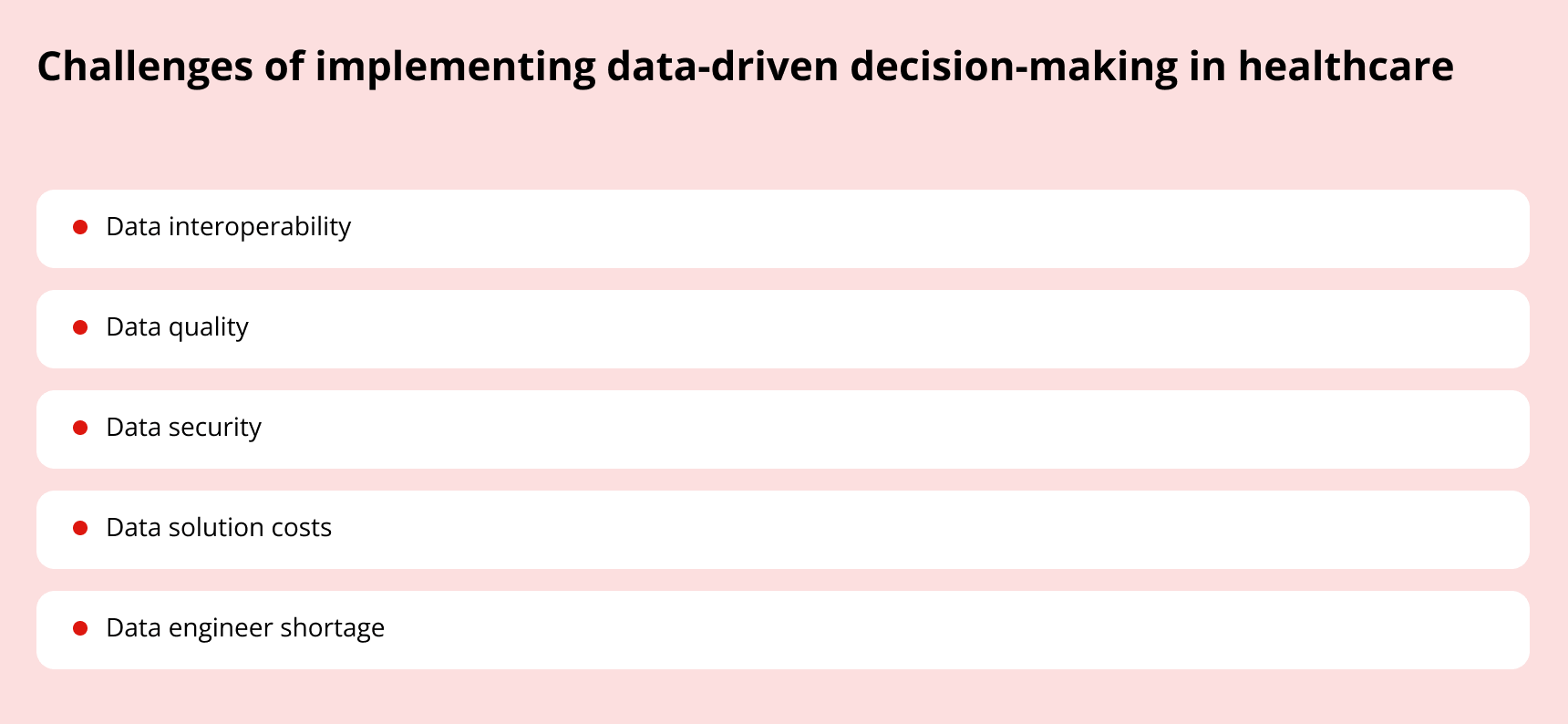
OK, the advantages of big data in healthcare are clear. But what about the challenges?
Data interoperability
Data is expanding, but it’s stuck in silos. HCPs, institutes, and others keep their data in separate systems that don’t talk to each other. Even when they try to connect these systems, it’s not straightforward or quick. Data comes in different formats, and there’s no universal standard for sharing it between systems. This slows down the development and integration of data-driven solutions in healthcare.
Data quality
Quality is another issue. When we use data from EHRs and wearables, it’s often incomplete, outdated, or inconsistent. And if data is entered by humans, it can have mistakes or miss important details. These problems can distort the whole picture and lead to errors in patient care.
In our work with products for data-driven decision-making in healthcare, we regularly update automatic quality control measures. This helps reduce errors, unnecessary readmissions, and duplicate testing. As a result, the data used is of the highest quality possible.
Data security
For big data healthcare solutions to work well, they need access to a wide range of data. It may even include social media activity and private recordings. But there’s a limit due to security rules. In the US, HIPAA and in the EU, GDPR, set strict rules on handling healthcare data.
For example, both laws outline when patients can limit access to their data. When they do, data providers and healthcare solution owners must follow these rules. In this case, they won’t be able to use or share that data.
Data solution costs
Funding is a big hurdle for data-driven decisions in healthcare. It costs a lot to develop products, hire tech experts, and maintain big data systems. These high expenses might stop enthusiasts from creating data-based healthcare solutions.
At Digiteum, we’re always seeking ways to reduce costs. To achieve that, we revisit product architecture, migrate data to more cost-effective platforms, and restructure data pipelines.
Data engineer shortage
If a company wants to build a product that promotes data-driven decision-making in healthcare, the question inevitably arises: who will build it?
Tech talent shortage is a big problem across all industries, and healthcare is no exception. Finding a reliable partner to build a dependable solution is challenging. Plus, the competition is tough. Companies have to fight for skilled engineers with tech giants and large corporations.
Digiteum has been working on healthcare projects since 2010. Over this time, we’ve built solid expertise in big data development services. We know how to reduce costs for complex healthcare systems while maintaining quality and security.
Here is our track record:
- Our portfolio includes award-winning products and collaborations with industry leaders like Diaceutics, Lymphoma Research Foundation, NextGate, Takeda, and many more.
- We work with a wide range of healthcare clients, from pharma to clinics and healthcare analytics firms.
- The global products we’ve been working on have thousands of users.
- Big data projects are our specialty. We have a skilled team of data engineers, software developers, and designers to deliver top-notch results.
- For us, creating high-quality products and working diligently is a win-win for all. Usually, our projects begin with one part, and then clients ask us to do more.
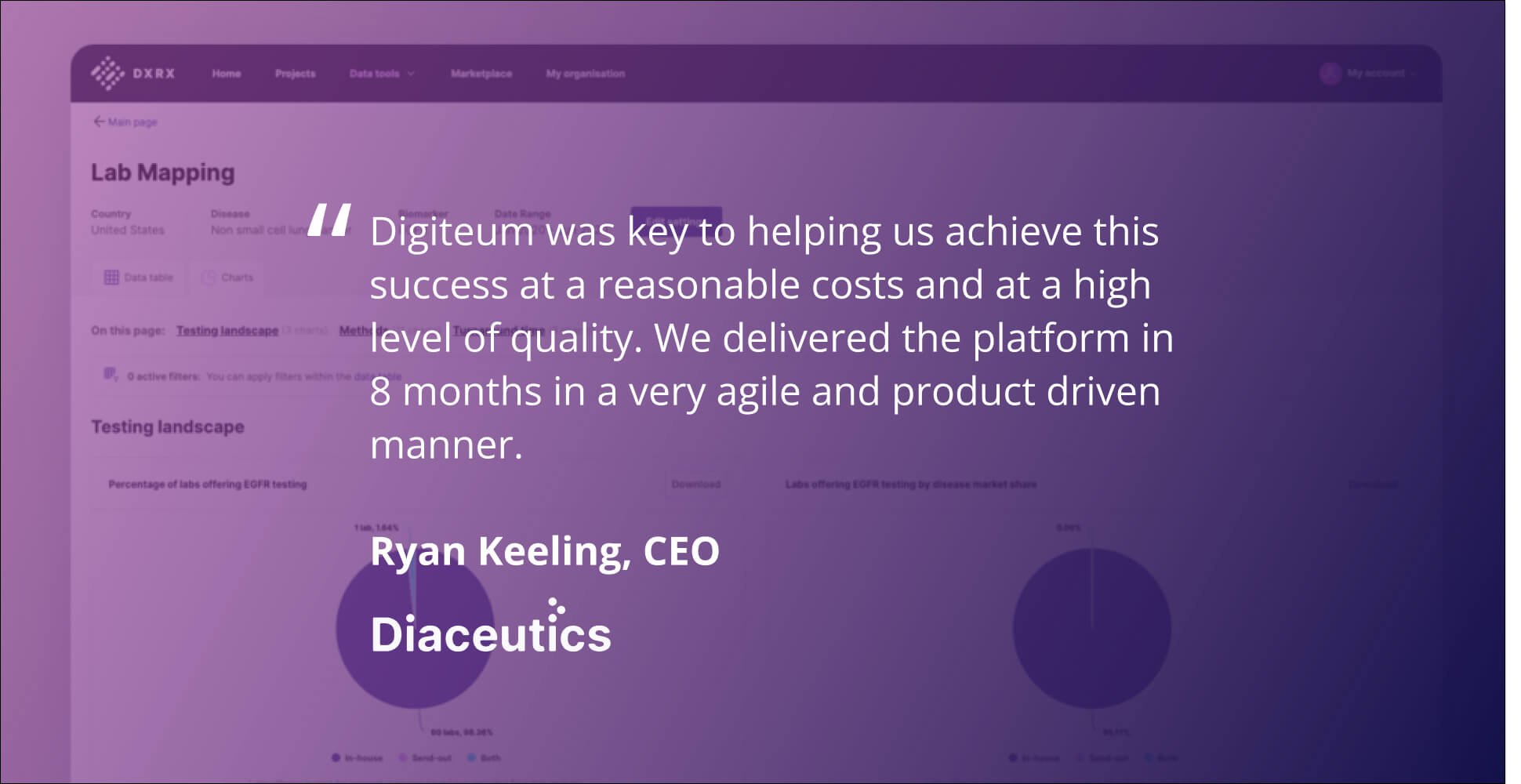
Quick wrap-up
- Healthcare has the data for smart decisions. But accessing it is tough — it’s scattered, diverse, and too much to process for humans alone.
- Technology steps in. It helps assess and analyze data and provides helpful insights.
- Developing solutions that drive data-based decisions in healthcare? Contact Digiteum.
FAQ
- EHRs
- Medical images
- Wearables and healthcare apps
- Public databases
- Claims
- Clinical trials
- Philips eICU is a telehealth program for intensive care units (ICUs). It uses data visualization and predictive analytics to better monitor patient stays.
- Johns Hopkins University has built a sepsis-detection system. The solution identifies sepsis risks and helps doctors intervene earlier.
- OncoHealth is a cancer-focused platform. It helps review treatment plans, collects evidence, and offers telehealth services.
